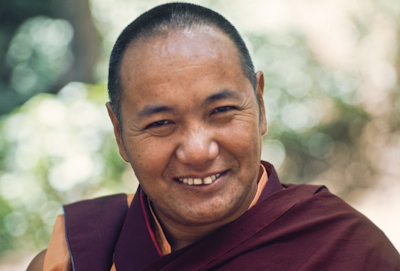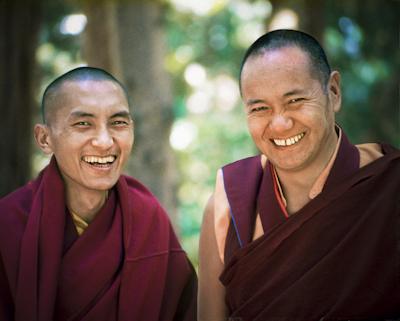Dear Friends,
Welcome to our seventh e-letter. Remember, if you've missed any of the previous ones, you can read them here. People can also sign up for the e-letter on that page, so if you know people who might be interested in receiving it each month, please forward it to them. Also, if your center has an email list, you're welcome to forward this e-letter to it, or post it on your Web site. We'd like to reach out.
We've also posted a short teaching by Lama Zopa Rinpoche that starts, "If you love your animal very much then this is what you must do for them for their good rebirth and quick liberation from samsara." In a wonderfully compassionate piece, Rinpoche then goes on to tell us how to do the best by our pets.
We also received recently some excellent new materials from the FPMT Education Department, in particular the 13-video set covering the entire Discovering Buddhism course and Lama Zopa Rinpoche's essential advice on death and dying. Go to the on-line FPMT shop for more information.
Otherwise, as I mentioned last time, we're in throes of reprinting "Becoming Your Own Therapist" and "Make Your Mind an Ocean" in a combined edition, "The Essence of Tibetan Buddhism", and a new book containing six talks by Lama Yeshe (excerpt below, still working on a title!). These should be available in two to three months.
Thank you so much for your support. Please try to make this e-letter more widely known and remember, we depend on your kind donations to make Dharma teachings available free of charge all over the world.
Much love,
Nick Ribush
Director
FOLLOW YOUR PATH WITHOUT ATTACHMENT
 Our minds are incredible. Our ups and downs have nothing to do with reality, nothing to do with the truth. It's very important to understand the psychology of this.
Our minds are incredible. Our ups and downs have nothing to do with reality, nothing to do with the truth. It's very important to understand the psychology of this.
It's common for us to think that our own path and ideas are good, worthwhile and perfect, but by focusing excessively on this, we subconsciously put other paths and ideas down. Perhaps I think, "Yellow is a fantastic color," and explain to you in great detail how yellow is good. Then, because of all my logical reasons, you too start think, "Yellow is good; yellow is the perfect color." But this automatically causes contradictory beliefs, "Blue is not so good; red is not so good," to arise in your mind.
There are two things in conflict with one another. This is common, but it's a mistake, especially when it comes to religion. We should not allow such contradictions in our mind where, by accepting one thing, we automatically reject another. If you check, you'll see it's not that you're blindly following something external but that your mind is too extreme in one direction. This automatically sets up the other extreme in opposition, and conflict between the two unbalances your mind and disturbs your inner peace.
This is how religious partisanship arises. You say, "I belong to this religion," and when you meet someone belonging to another, you feel insecure. This means your knowledge-wisdom is weak. You don't understand your mind's true nature and cling to an extreme point of view. Don't allow your mind to be polluted in this way; make sure you're mentally healthy. After all, the purpose of the practice of religion, Buddhism, Dharma, meditation or whatever else you want to call it is for you to take your mind completely beyond unhealthy, contradictory mental attitudes.
Lord Buddha himself exhorted the students he was teaching to practice without attachment. Although he taught a precise, incredible universal method, he made his students promise not to be attached to his teachings or to realizations, inner freedom, nirvana or enlightenment itself.
To achieve freedom from attachment is a very difficult thing, especially in a materialistic society. It's almost impossible for you to deal with material things without attachment and this causes you bring a grasping attitude to spiritual matters. But even though it's difficult, you need to check how Lord Buddha's psychology offers you perfect mental health, free of extremes of this or that.
Lama Yeshe gave this teaching at the Chinese Buddhist Society, Sydney, 24 April 1975. Edited from the Lama Yeshe Wisdom Archive by Nicholas Ribush. The remainder of the talk can be found in Chapter 6 of The Peaceful Stillness of the Silent Mind.































